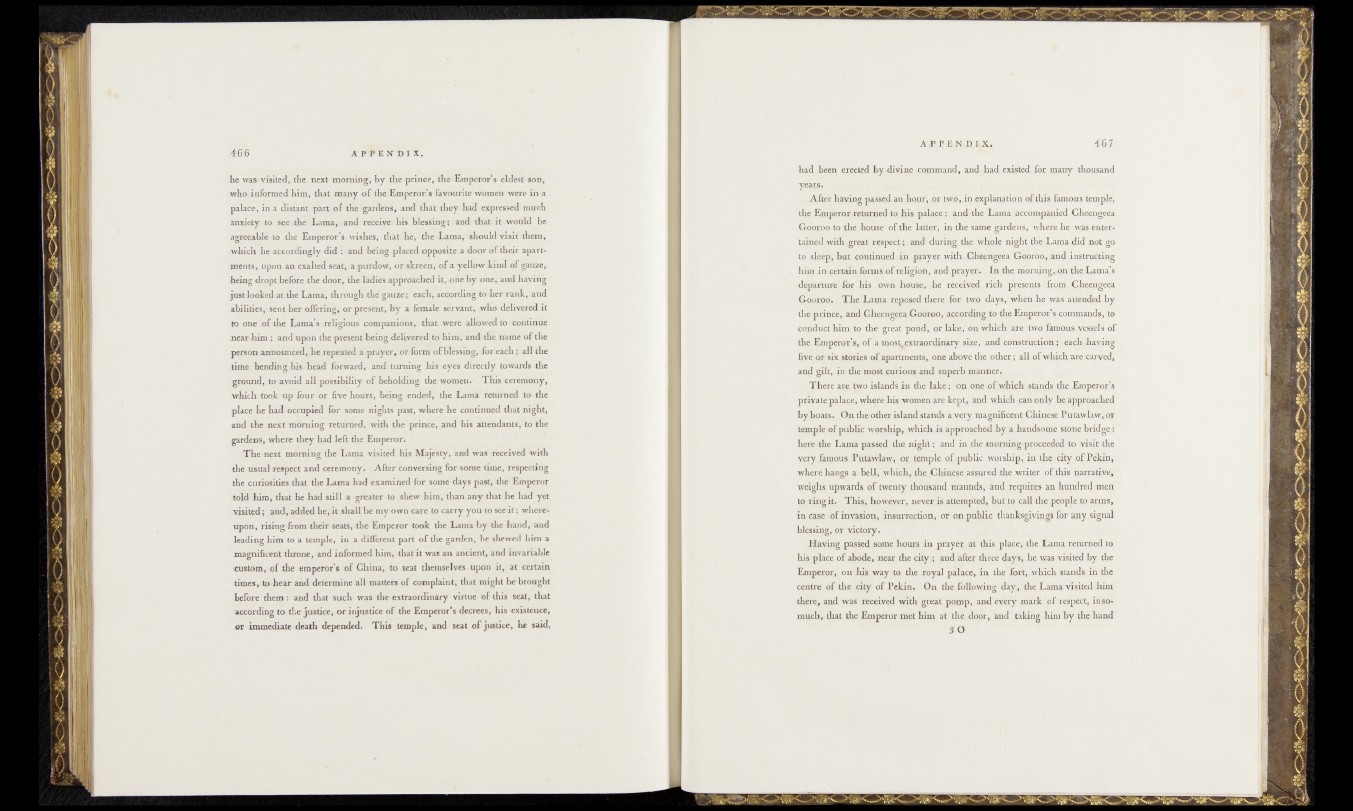
he was;visited, the next morning, by the prinee, the-Emperor’s eldest son,
who unformed him, that many ofthe Emperor’s favourite women were in-a
palace, in a distant part of the gardens, and that they had expressed much
anxiety to see the Lama, sand receive, his blessing; -and that it-would be
agreeable, to the Emperor’s wishes, tliaf he, the Lama, should visit them,
which he accordingly did : and being placed opposite a door of their apartments,
uponao exalted seat, a purdow, or skreen, of a yellow kind of gauze,
being dropt before the door, the ladies approached it, one by one, and having
just looked at the Lama, through the gauze ; each, according to her rank, and
abilities, sent her offering, or present, by a female servant, who delivered it
to one: of the Lama’s religious companions, that were allowed to continue
near him ; and .upon the present being delivered to him, and the name of the
person announced, he repeated a prayer, or form ofblessing, for each; all the
time bending his head forward, and turning his eyes directly towards the
ground, to avoid all possibility of beholding the women. This ceremony,
which took up four nr five hours, being ended, the Lama returned to the
place he had occupied for some nights past, where he continued that night,
and the next morning returned, with the prince, and his attendants, to the
gardens, where they had left the Emperor.
The next morning the Lama visited his Majesty, and was received with
the usual respect and ceremony. After conversing for some time, respecting
the curiosities that the Lama had examined for some days past, the Emperor
told him, that he had still a greater to shew him, than any that he had yet
visited; and, added he, it shall be my own care to carry you to seeit; whereupon,
rising from their seats, the Emperor took the Lama -by the hand, and
leading him to a temple, in a different part of the garden, he shewed him a
magnificent throne, and informed him, that it was an ancient, and invariable
custom, of the emperor’s of China, to-seat themselves.upon it, at certain
times, to hear and determine all matters of complaint, that might be brought
before them: and that such was the extraordinary virtue of this seat, that
according to tWjustice, or injustice of the Emperor’s decrees, his existence,
or immediate death depended. This temple, and seat of justice, he said,
had been ejected by divine command, and had existed for many thousand
yeaçs.
After, having passed an hour, or pwo, in explanation of this famous temple,
the Emperor returned to his palace ; and the Lama accompanied Cheengeea
Gooroo to the house of tRe latter, in the same gardens,- v^hefe- he,,waséHtefT
tained with great respect; and during: the whole nijgbt the Lama did not go
to sleep, hut continued in prayer,with Çheçng-eea Gooroo, and instructing
him in certain forms of religion,, and prayer. In the morning, on the Lama’s
departure for his own house, he received rich presents from Cheengeea
Goproo. The Lama reposed there for two dgys, when he was attended by
the prince, and Cheengeea Gooroo, according to the Emperor’sicommands, to
conduct him to the gréât pond, or lake,'on which are two famous, vessels ipf,
the Emperor’,s, pf a mosExtraordinary size, and constructie«*; -each;haring
Jjve or six stories of apartments,, one above the other; all .of which .are-carved,•
and gilt, in the most curious and superb manner.
, There are two islands in the lake; on one of which stands the Emperor’s
privatç palace, where his women are kept, and which can oqly he approached
by boats. On the other island stands a very magnificent Chinese Putawlaw, or
temple of public worship, which is approached by a handsome stone bridge :
here the Lama passed die night ; and in the morning ^proceeded to visit .the
yery famous Putawlaw, or temple erf public worship, in .the city of Pekin,
where hangs a bell, which, the Chinese assured the writer, of this narratty^.;
weighs upwards of twenty thousand maunds, and requires an hundred men
to ring it. This, however, never ,is attempted, fm-tfo call the people;to arms,
incase of invasion, insurrection, or on public thanksgivings for any signal
blessing, or victory.
Having passed some hours in prayer at this plaoe; thé.tLàmà.returned to
his place of abode, near the city ; and after three days,, he was visited by the
Emperor, on his way -to the royal palace, in the fort; which stands in the
centre of the city of Pekjn. On the following day, the Lama visited him
there, and was received with great pomp., and every mark of respect, insomuch,
fhat the Emperor met him at thé door, and taking him by the hand